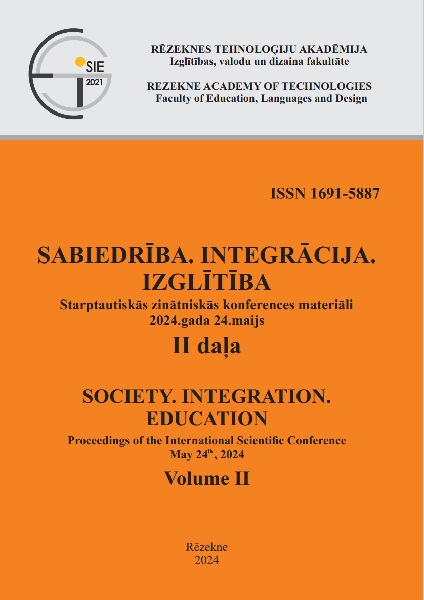MANAGING THE PANDEMIC IN CARE HOMES – OLDER PEOPLE'S PERSPECTIVE
DOI:
https://doi.org/10.17770/sie2024vol2.7826Keywords:
aging, care homes, communication, Covid-19, education activitiesAbstract
The ageing population and the challenges it poses are becoming more and more pressing, both in Lithuania and in other European countries. This requires constant attention from researchers and institutions providing social services and education activities. A new challenge is the Covid - 19 pandemic, which has resulted in nursing homes banning visits to residents and restricting educational activities in order to protect the elderly. Residents were not allowed to see relatives and friends. The pandemic and the quarantine imposed in Lithuania caused stress and anxiety for the residents and the negative social consequences are still being felt even after the pandemic. Nine semi-structured interviews were carried out to reveal the attitudes of older people towards the management of the pandemic in care institutions and the peculiarities of communication in care homes during the quarantine. The research revealed that during quarantine, lonely older people were sensitive to a lack of opportunities for social communication, and felt a lack of closeness among people. As a result of the quarantine regime lonely older people felt unfulfilled, lost the ability to realize themselves through certain activities.
References
Apostolou, M., Keramari, D., Kagialis, A., Sullman, M. (2020). Why people make friends: The nature of friendship Personal Relationship.1–15. DOI: 10.1111/pere.12352
Courtin, E. & Knapp, M. (2017). Social isolation, loneliness and health in old age: a scoping review. Health and Social Care in the Community, 25(3), 799–812, doi: 10.1111/hsc.12311
Holmes, E.A., O’Connor, R.C., Perry, V.H., et al. (2020) Multidisciplinary Research Priorities for the COVID-19 Pandemic: A Call for Action for Mental Health Science. Lancet Psychiatry, 7, 547-560. Retrieved from: https://doi.org/10.1016/S2215-0366(20)30168-1
Kuckartz. U. (2019). Qualitative Text Analysis: A Systematic Approach G. Kaiser and N. Presmeg (eds.), Compendium for Early Career Researchers in Mathematics Education, ICME-13 Monographs. DOI: https://doi.org/10.1007/978-3-030-15636-7_8
Lekamwasam, R. & Lekamwasam, S. (2020). Effects of COVID-19 Pandemic on Health and Wellbeing of Older People: A Comprehensive Review. Annals of Geriatric Medicine and Research, 24 (3), 166-172, DOI: https://doi.org/10.4235/agmr.20.0027
LR vyriausybės 2020 m. kovo14 d. nutarimas Nr. 207 „Dėl karantino Lietuvos Respublikos teritorijoje paskelbimo“ (2020). Retrieved from: https://eseimas.
lrs.lt/portal/legalAct/lt/TAD/deaf8694663011eaa02cacf2a861120c
Newall, N. E. G. & Menec, V. H. (2019). Loneliness and social isolation of older adults: Why it is important to examine these social aspects together. Journal of Social and Personal Relationships, Vol. 36(3). 925–939, DOI: https://doi.org/10.1177/0265407517749045
Singh, A., Misra, N. (2009). Loneliness, depression and sociability in old age. Industrial psychiatry journal, 18 (1), 51-55.
Straigytė, L., Briliūtė, M. (2020). Širdies ir kraujagyslių pažaida sergant COVID – 19 infekcija: literatūros apžvalga. Medical sciences, 8 (16), 262-271.






